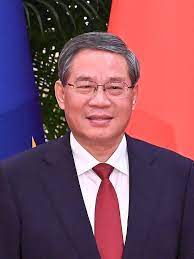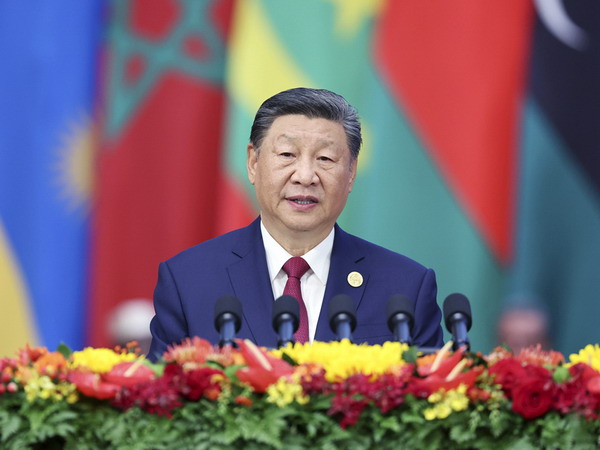At the Opening Ceremony Of the World Economic Forum Annual Meeting 2024
Greetings to you all. It gives me great pleasure to come to the beautiful Davos for the World Economic Forum Annual Meeting 2024.
The theme of this meeting, “Rebuilding Trust,” echoes well with people’s concerns and will surely strike a chord with many. As I see it, the word “rebuild” implies at least three things. First, trust was once prevalent. To a large extent, it was trust between countries that enabled the huge progress in economic globalization over the past decades. Second, the foundation of trust has now been eroded. The lack of trust is aggravating risks to global growth and peaceful development. Third, rebuilding trust is essential. Whether it is to overcome current difficulties, or to create a better future, it is essential that we discard prejudice, bridge differences and work as one to tackle the trust deficit.
Where does trust come from? In my view, it comes, first and foremost, from our shared aspiration for a better future for humanity and from our common will to work together for that vision. As President Xi Jinping points out, changes of the world, of our times, and of historical significance are unfolding like never before, and the world has entered a new period of turbulence and transformation. Yet the overall direction of human development and progress will not change, the overall dynamics of world history moving forward amid twists and turns will not change, and the overall trend toward a shared future for the international community will not change. After all the shifts and changes over the years, we should all the more cherish communication and exchange, all the more cherish solidarity and cooperation, all the more cherish openness and sharing, and all the more cherish peace and stability. These are not only ways to respond to changes, but in some sense, also ways to rebuild trust. In this connection, I wish to share with you five proposals on rebuilding trust and enhancing cooperation in the economic field.
First, strengthening macroeconomic policy coordination to build greater synergy for global growth. In today’s world, countries have very close economic linkages, which means their macroeconomic policies have more notable spillover effects. In the face of global crises, fragmented and separate responses will only leave the world economy more fragile. As such, it is crucial that, in making and executing macro policies, countries around the world, especially major economies, step up dialogue and communication, take more coordinated and effective measures, firmly uphold the multilateral trading system, jointly improve global economic governance, and foster new drivers of global growth.
Second, strengthening international industrial specialization and collaboration to keep global industrial and supply chains stable and smooth. Figures show that from 2020 to 2022, each year saw on average over 5,400 new discriminatory trade and investment measures worldwide, nearly doubling the number before the pandemic. As we all know, industrial and supply chains in the economy are like the circulatory system of the human body. Any obstacles or disruptions can slow down or block the flow of lifeblood of the world economy, which not only compromises development efficiency but also triggers various economic risks and social problems. What truly serves the common interests of all is to fully respect the laws of international industrial specialization, firmly advance trade and investment liberalization and facilitation, tighten the bond of cooperation, make the pie of mutual benefit bigger, and steadily enhance the stability of global industrial and supply chains.
Third, strengthening international exchanges and cooperation on science and technology to better benefit humanity with technological advances. The new round of technological revolution and industrial transformation has created a new “coopetition” relationship between countries. To keep the competition healthy and bring out the greatest vitality, the only way is to enhance cooperation in innovation. Scientific and technological fruits should benefit humanity as a whole, instead of becoming a means to restrict or contain the development of other countries. We should advance international exchanges and cooperation on science and technology with a more open mindset and more open measures, work together for an open, just and nondiscriminatory environment for the development of science and technology, and break the barriers impeding the flow of factors of innovation, so as to let innovation thrive in an open environment.
Fourth, strengthening cooperation on green development to actively tackle climate change. Humanity still faces many challenges in addressing climate change and promoting green and low-carbon transition. Talks about the need for stronger cooperation on climate governance are often accompanied by actions of erecting barriers to green trade. Some high-quality and efficient green and low-carbon technologies and products cannot flow freely. It is important that we uphold the principle of common but differentiated responsibilities, better synergize our green development strategies, remove various barriers in this field, and jointly work for a complete transition to a greener economy and society.
Fifth, strengthening North-South and South-South cooperation to build a universally beneficial and inclusive world economy. In recent years, problems like the North-South gap, divergences in recovery, and the technological divide have become more acute. Many developing countries are in distress. According to World Bank estimates for this year, the average income in more than one third of the low-income countries will stay below the 2019 level. We Chinese people believe that benefits should be mutual. True and good development is development for all. We need to fully implement the U.N. 2030 Agenda for Sustainable Development, strengthen global development cooperation, bridge development gaps, and create new cooperation highlights in areas such as poverty alleviation, food security and industrialization, so as to benefit the people of all countries with more fruits of cooperation.
The traditional Chinese culture very much values credibility. China is a country that attaches great importance to commitments, honoring its words with concrete actions all along. With the greatest sincerity, utmost efforts and concrete results, China has proven consistently to the world that it is a country most worthy of trust. We are also well aware that apart from objective reasons, there are also subjective factors that aggravate the trust deficit. In bilateral and multilateral relations, there are many examples where one side’s capriciousness undermines mutual trust with others. In our view, the best way to earn trust is to be a better version of oneself. Only when all sides treat each other with sincerity and work in the same direction can there be a stronger foundation of trust and more fruits of cooperation.
Under the current circumstances, the world economic recovery requires strong underpinnings. Greater contribution is expected from all countries, especially major economies. I know that you all follow the Chinese economy closely and may have your own observations. So how should one look at the Chinese economy? I believe it is similar to looking at the Alps, the undulating mountain range with magnificent peaks, from the small town of Davos. My European friends told me that to fully appreciate the majestic beauty of the Alps, one has to zoom out and look from afar. It is the same with the Chinese economy. One has to broaden the vision and take a panoramic view to see the whole picture in an objective and comprehensive manner and truly grasp where it is now and where it is going. Here I would like to share with you some perspectives on the Chinese economy.
First, the Chinese economy is making steady progress and will continue to provide strong impetus for the world economy. China is an important engine of global development. Over the years, its contribution to world economic growth has stayed at around 30 percent. In 2023, the Chinese economy rebounded and moved upward, with an estimated GDP growth of around 5.2 percent, higher than the around 5 percent target set at the beginning of the year. In promoting economic development, we did not resort to massive stimulus. We did not seek short-term growth while accumulating long-term risks. Rather, we focused on strengthening the internal drivers. As the second largest economy in the world, China has established, after years of development, sound and solid fundamentals. Just as a healthy person often has a strong immune system, the Chinese economy can handle ups and downs in its performance. The overall trend of long-term growth will not change. In terms of the industrial base, China is the only country with industries across all categories in the U.N. industrial classification. The added value of China’s manufacturing industry accounts for around 30 percent of the global total, ranking first in the world for 14 consecutive years. China is also home to over 200 mature industry clusters. With its large scale, complete categories and strong supporting capacity, China’s industrial system can meet the demand of the rapid development of social productivity and will contribute to better global allocation of production factors and the rise in global productivity. In terms of production factors, China’s demographic dividend is turning into talent dividend. We now rank first in the world in terms of the size of talent pool, human resources in science and technology and the total number of researchers. Capital shortage is replaced by abundance. Our global share of annual capital formation has risen to about 30 percent. In addition, with its huge data output and rich data resources, China has the second largest data mine in the world. In terms of innovation capacity, China’s total input in research and development and investment in the high-tech sector has been growing at double-digit rates for several years running. New technologies, including cloud computing, big data, artificial intelligence and blockchain, are being applied at a faster pace. New products and new business forms such as intelligent terminals, robots and telehealth keep emerging. China now has some 400,000 high-tech enterprises and ranks second globally in the number of unicorn companies. All this will boost the formation and cultivation of new growth drivers in China. Looking at the broader picture, we are now advancing Chinese modernization on all fronts through high-quality development. Delivering modernization to more than 1.4 billion people will be a remarkable achievement in human history, one that will provide continuous impetus to the development of China and the wider world.
Second, China has a supersize market with rapidly unlocked demand. It will continue to provide a big stage for various businesses and talents. In the face of weak global demand, market becomes the most scarce resource. The Chinese market, with its vast space and growing depth, will play an important role in boosting aggregate global demand. In China, there are now over 400 million people in the middle-income bracket, and the number is expected to reach 800 million in the next decade or so. For a growing range of products and services, the focus of consumer demand is shifting from quantity to quality, which will generate strong driving force for upgrading consumption. China’s urbanization rate is now more than 10 percentage points lower than the average level of the developed countries. There is much room for infrastructural upgrading in urban renewal, transportation and telecommunications, among others. There are also some 300 million rural migrants who are acquiring permanent urban residency at a faster pace. These will create massive demand in areas such as housing, education, medical services and elderly care. China is deepening its transition toward green and low-carbon growth. Close to half of the world’s installed photovoltaic capacity is in China. Over half of the world’s new energy vehicles (NEVs) run on roads in China, and its NEV ownership has reached over 20 million units. China contributes one-fourth of the increased area of afforestation in the world. China is also cultivating large-scale new growth drivers in sectors such as green infrastructure, green energy, green transportation and green lifestyle. This will generate investment and consumption markets with an estimated size of RMB10 trillion yuan annually, and promises huge potential. We will keep exploring and unleashing such market demand, increase import of high-quality goods and services from all over the world, attract more foreign investment in areas including medium- and high-end manufacturing and biopharmaceuticals, and provide broader space for boosting global trade and investment.
Third, China remains firmly committed to opening up. We will continue to create favorable conditions for the world to share in China’s opportunities. In the past four decades and more, China has achieved development and shared benefits with the world through opening up. Right now, China is a major trading partner of over 140 countries and regions. Our overall tariff level has been cut to 7.3 percent, relatively on par with the developed members in the World Trade Organization. By opening up wider, we aim to share China’s opportunities and develop together with all in the world. To business leaders here today, I want to say that over the years, multinational corporations have cultivated the Chinese market and, based on China’s manufacturing prowess, expanded their global production, grown fast and had good rewards. In the past five years, the return on foreign direct investment in China stands at around nine percent, which is quite competitive globally. Choosing the Chinese market is not a risk, but an opportunity. We embrace investments from businesses of all countries with open arms, and will work tirelessly to foster a market-oriented, law-based and world-class business environment. We will steadily expand institutional opening up, continue to shorten the negative list for foreign investment, follow through on removing all restrictions on access for foreign investment in the manufacturing sector, and guarantee national treatment for foreign businesses. With regard to concerns of some multinationals on issues such as cross-border data flow and equal participation in government procurement, we are working on the formulation of relevant policies. We will also hear the views of foreign businesses regularly and take active steps to address reasonable concerns. All in all, no matter how the world changes, China will stay committed to the fundamental national policy of opening up and open its door still wider to the world.
Ladies and Gentlemen,
Friends,
In some 20 days, we will celebrate the Spring Festival to usher in the Chinese Year of the Dragon. In traditional Chinese culture, the dragon is a symbol of auspiciousness, wisdom and strength. In the face of common challenges, we hope that all the members of the international community, with a shared aspiration for a better future and with the vigor of a flying dragon, will forge ahead toward building a community with a shared future for mankind. (PR)


 Government1 week ago
Government1 week ago
 Sports3 weeks ago
Sports3 weeks ago
 Business4 weeks ago
Business4 weeks ago
 Religion3 weeks ago
Religion3 weeks ago
 Business3 weeks ago
Business3 weeks ago
 Sports2 weeks ago
Sports2 weeks ago
 Government2 weeks ago
Government2 weeks ago
 International2 weeks ago
International2 weeks ago






















